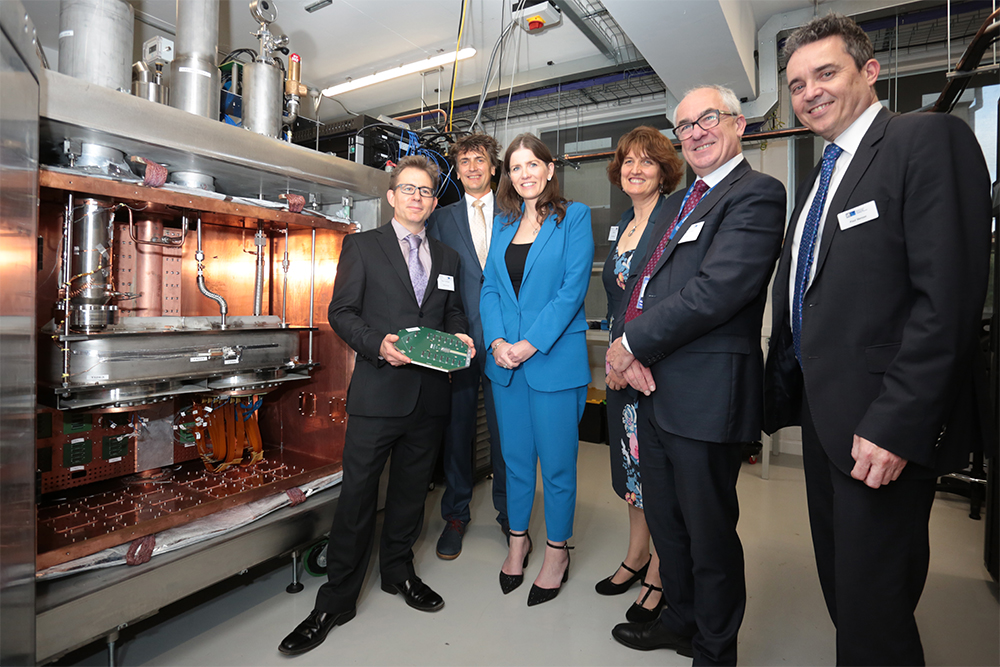Silicon Valley start-up PsiQuantum received £9 million UK government funding to open its first advanced research and development (R&D) facility outside of the US at the Science and Technology Facilities Council’s (STFC) Daresbury Laboratory.

Powered by breakthroughs in silicon photonics and fault-tolerant quantum architecture, the quantum computing company is on a mission to build the world’s first commercially useful quantum computer, capable to tackle some of the world’s greatest challenges – across climate technologies, pharmaceuticals, healthcare, finance, energy, transportation and more.
Quantum computing is a type of computing that leverages the principles of quantum mechanics to perform certain calculations much faster than classical computers. Unlike classical bits, which are binary (0 or 1), quantum bits or qubits can exist in multiple states simultaneously, enabling quantum computers to explore many possibilities at once. This property allows quantum computers to potentially solve complex problems at speeds that are currently beyond the capabilities of classical supercomputers.
PsiQuantum uses light and turns infinitesimally small photons of light into qubits. Their approach is based on single-photon qubits, which have significant advantages at the scale required to deliver a fault-tolerant, general-purpose quantum computer.
Like all leading quantum computing efforts, this requires cryogenic cooling but the advantage of a photonic approach is that the cooling requirements are far less demanding. PsiQuantum’s approach requires cryogenic cooling to operate extremely sensitive single-photon detectors, which are used to read the state of the photonic qubit.
These devices operate at temperatures just a few degrees above absolute zero – equivalent to the temperature of deep space.
PsiQuantum teamed up with STFC to develop the next generation of high-power cryogenic modules which will be necessary to scale photonic quantum computers to millions of qubits. The company will work with Daresbury Laboratory experts specialised in large-scale cryogenic infrastructure to develop advanced cryogenic systems, to build an advanced cryogenics centre that will increase its cryogenic capabilities 100-fold.
Here, they will build and test quantum computing modules with the highest cryogenic cooling power to date.
Mark Thompson, Chief Technologist and Co-Founder at PsiQuantum, said:
“We are very excited to be setting up a lab in the UK in collaboration with the STFC’s Daresbury Laboratory. The UK has a long history in quantum technologies and a talent pool of exceptional quantum engineers. The STFC team and facilities are world class, with a deep history of accomplishments in large-scale scientific infrastructure. Access to existing cryogenic infrastructure and expertise accelerates PsiQuantum’s mission to deliver a large-scale quantum computer.”
About PsiQuantum
Powered by breakthroughs in silicon photonics and fault-tolerant quantum architecture, PsiQuantum is building the first utility-scale quantum computer to solve some of the world’s most important challenges. PsiQuantum’s approach is based on single-photon qubits, which have significant advantages at the scale required to deliver a fault-tolerant, general-purpose quantum computer. With their photonic chips manufactured in a world-leading semiconductor fab, PsiQuantum is uniquely positioned to deliver quantum capabilities reaching the scale needed to drive advances in climate technologies, pharmaceuticals, healthcare, finance, energy, agriculture, transportation, communications, and beyond. To learn more, visit www.psiquantum.com.
Follow PsiQuantum: LinkedIn
About The Science and Technology Facilities Council (STFC)
The Science and Technology Facilities Council (STFC), part of UK Research and Innovation (UKRI), funds and supports research in particle and nuclear physics, astronomy, gravitational research and astrophysics, and space science. It operates a network of five national laboratories as well as supporting UK research at a number of international research facilities including CERN, FERMILAB and the ESO telescopes in Chile. STFC is keeping the UK at the forefront of international science and has a broad science portfolio, working with the academic and industrial communities to share its expertise
